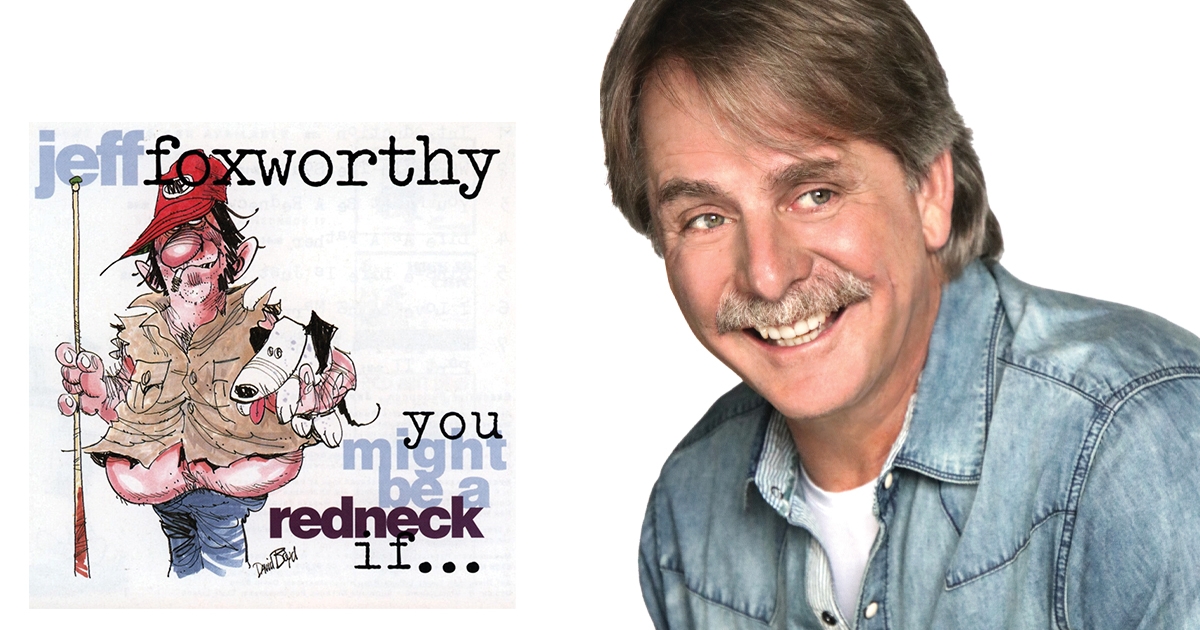Back in 1993, Jeff Foxworthy started a cultural phenomenon with the release of his now-classic comedy album, You Might Be a Redneck If…. From there, he gradually carved out his spot as our generation’s Blue Collar Mark Twain.
Thanks to the Southern stand-up’s working-class stories, and his endless stream of lighthearted one-liners (i.e., “You might be a redneck if the stock market crashes and it doesn’t affect you one bit”), the funnyman nabbed a series of Grammy Award nominations, television shows, radio programs and book deals. That trend continues today.
The 61-year old Georgia native kindly chatted with Revue. Here’s what he had to say.
For the first time, you’re performing at LaughFest. With shows like this, how do you choose what material you’re going to do?
It’s funny, because I’m in a bit of a weird spot because I’ve been doing this for a long, long time. I think I’ve done three Blue Collar movies, couple of HBO specials, couple of Showtime specials, 50 Tonight Shows, so I have things people want to hear. But as a comic, I’m still going out to clubs working on new stuff, so a little bit of the challenge for me is to find that balance. To find if I can do the new stuff, that I think people are going to like and I’m intrigued with, and still do a couple of the “Greatest Hits” songs.
People want to hear “Satisfaction” when they see the Rolling Stones.
You have to play “Satisfaction.” It’s almost by law that I have to throw in a few “You Might Be a Redneck” jokes. But there are some things, Lord, I did 30 years ago and people will come up and say, “Hey, will you tell the bit about the bit where you saw your grandmother naked?” And I’m like, “Uh, how did that one go? That was 30 hours of material ago.”
Thanks to the internet, people can find tons of old gigs, I bet.
You know, not long ago, I was going through YouTube, and one of the suggestions that came up was my first set on (The Tonight Show Starring) Johnny Carson. I had never seen it. I was like, “Wow. Oh, hell. That was pretty good.”
Back then, a comic getting approval from Johnny Carson was like becoming a Made Man, huh?
It was like being a Made Man, because the word was: If Johnny didn’t like you, he would just clap. If he liked you, he’d give you that big “OK” sign. If he loved you, he’d call you over (to talk with him). So, when I got to the end of my six minutes, I’m scarred to look over because it’s like Caesar deciding: Do I live or do I die? I remember going out and hitting the star (on the stage), and then I remember hearing him laugh while I was doing it and thinking, “OK. This is a good sign.” When I got to the end, I look over and he’s waving me to the chair. It was like, “Holy cow!” Literally, the next week I had casinos in Vegas wanting me to headline, for no other reason other than Johnny liked me.
In 1984, wasn’t it your co-workers at your IBM job who encouraged you to pursue stand-up?
Yeah, my IBM pals entered me into a contest. I’d never been to a comedy club. I was like, “Shoot. I’d better write something.” It wasn’t even an amateur night — it was a contest for working comics. I’m like, “Dadgummit, I should be starting at an amateur night.” But I said, “Let me go watch one week.” So, I went and watched. Went home and wrote five minutes and then I won the contest. I remember driving home and thinking, “Oh, my God. This is what I want to do. I found it.” I knew that night I was going to quit my job at IBM.
Did you hit the road and start performing at clubs across the country after that?
Oh, yeah. I wore out three cars. Remember those old pocket calendars? Back then, I’d write down every date I was doing. A few years ago, I was cleaning out old desk drawers and I found the calendar. My first year on the road, I did 406 shows and I made $8,300. My parents thought I had lost my mind. But I was working and I had a passion for it. I was on stage every night, sometimes at two or three different places. I remember my wife giving me $30 a week to live off of. That was my food for the week: $30.
I heard big-city agents used to suggest you drop your Southern accent. What inspired you to stay true to your roots?
It’s weird, Rich. I remember seeing a thing when I was about 10 years old. It was an interview with Richard Petty, the racecar driver. They were asking him, “What’s the most important thing you’ve learned in life?” He said, “Don’t outgrow your raisin’.” Meaning: Don’t forget where you came from. That just stuck to my soul. Even this year, judging on NBC’s Bring the Funny, with the other comics, I was like, “For this to work, you’ve got to be true to yourself.” I know who I am. I grew up with a dirt yard. Today, if I’m not working, I’m farming. I’m on my tractor. I’m bowhunting or something. If I try to lose this accent and be something else, it’s not going to work. I was like, “Hey, Seinfeld’s not losing his accent, Leno isn’t losing his — why do I have to lose mine?” Looking back, I’m just so glad I didn’t.
Obviously, there was a market for your brand of humor. You’ve sold more comedy records than anyone.
I mean, that’s proof you’ve tapped into an unrepresented market in comedy. People were thinking about New York and Los Angeles, but not all the places in between. That’s why the Blue Collar Comedy Tour was so successful. The people in L.A. were going, “Well, you’re not on the cutting edge.” I said, “Well, guess what, there are about 200 million people in this world just like me.”
How has your comedy-writing process changed from your early days to now?
Gosh, that’s such a great question. I don’t think anyone has ever asked me that. Yeah, obviously, I am not doing 500 shows a year now — now I do between 80 and 100 shows each year. But in those days, you’d have an idea, walk onstage and then throw it out there. I used to throw a four-line idea out there, and if two of the lines worked, I keep them and then add two more. I always imagined it like clay: You’re slowly building this bit.
Recently, how have you been crafting jokes?
Well, now I’m doing something I’ve never done. I’m writing a new hour all at one time. I used to do it in increments of 10 minutes or 15 minutes. Now, I just sat there with an hour. I had ideas for about two or three different things and I wrote everything I could think about, based on those things — then I would go try them. So, that’s like dumping a load of clay on the table and then cutting away the parts that didn’t work opposed to building it up slowly. They both get you to the same place, and even other comics are going, “Are you out of your mind?! Nobody does a new hour at a time!” But it worked out that way. I wanted to see if I could do it. I’ll probably do a new special out of it.
You’re a somewhat clean comic, but do you ever come up with dirtier jokes you have to leave on the cutting room floor?
No. I usually just call (fellow Blue Collar comedian) Ron White and give them to him. I’ll go, “Look, I can’t say this, but you can.” We do that quite a bit. Or, he’ll have an idea and go, “I have an idea but it’s way too clean for me.” I go, “I’ll take it.”
Jeff Foxworthy– Gilda’s Laughfest
DeVos Place - Steelcase Ballrooms
303 Monroe Ave. NW, Grand Rapids
March 14, $75
laughfestgr.org





